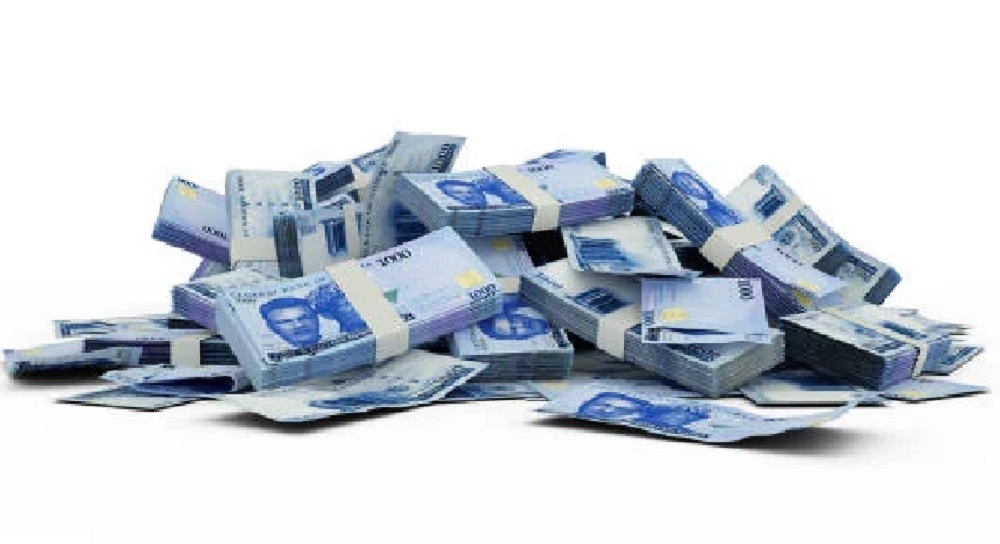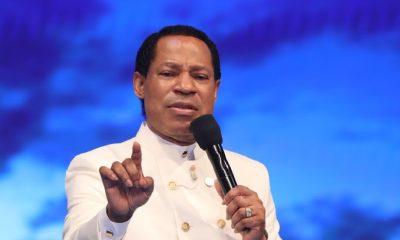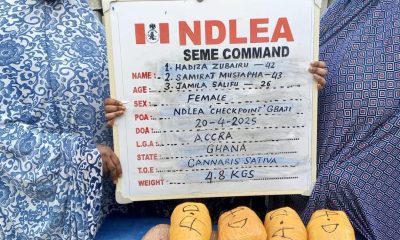Economy
FG reaffirms support for NNPC Limited’s 100,000 barrels per day production

The Honourable Minister of State for Petroleum Resources (Oil), Senator Heineken Lokpobiri, has reaffirmed the Federal Government of Nigeria’s commitment to supporting the NNPC Limited/FIRST Exploration; Petroleum Development Company Limited (FIRST E&P) Joint Venture (JV) in achieving its ambitious target of producing 100,000 barrels of oil per day (BOPD).
The Minister made this declaration during a comprehensive engagement with the JV, which included a tour of its offshore drilling and production facilities in the Niger-Delta.
The two-day visit was designed to provide the Honourable Minister firsthand insight into the JV’s operations and underscore its contributions to Nigeria’s energy security and transition goals.
Head, Joint Venture Investment Management, NNPC Upstream Investment Management Service(NUIMS), Mr. Olanrewaju Igandan; Minister of State, Petroleum Resources(Oil), Senator Heineken Lokpobiri; Managing Director, FIRST E&P Development Company Limited, Ademola Adeyemi-Bero and Managing Director, First Marine and Engineering Services Ltd, Joseph Penawou during the tour of Ogu Base logistics in Yenagoa Bayelsa State
The visit commenced with a tour of the Abigail-Joseph, the JV’s Floating Production Storage and Offloading (FPSO) vessel, followed by inspections of the Anyala OML 83 and Madu OML 85 Conductor Supported Platforms (CSPs) on Tuesday, November 19, 2024. The Minister’s itinerary also included a visit to the JV’s Ogu Logistics Base and a Host Community Stakeholders Engagement meeting in Yenagoa, Bayelsa State.
Describing his tour as quite strategic to Nigeria, the Minister disclosed that by meeting this ambitious 100,000 BOPD target, the JV would be helping the Federal Government achieve its production goal of 2.5 million BOPD by 2025. The Minister also praised FIRST E&P for its role in Nigeria’s recent achievement of 1.8 million BOPD and highlighted the strategic significance of the company’s operations to national growth.
During an engagement held with the Minister, FIRST E& P’s Managing Director, Ademola Adeyemi-Bero, reaffirmed the company’s commitment to supporting the Federal Government in achieving its target by maximising production, optimising efficiency, and contributing to Nigeria’s energy security through the NNPCL/FIRST E&P JV partnership. “For a nation like Nigeria, where oil and gas remain critical drivers of socio-economic growth, ensuring a sustainable energy supply is essential for industrialization, economic diversification, and improving the quality of life for millions. At FIRST E&P, our vision is strongly aligned with the national priorities for production. With a steady output of 56,000 BOPD, we are focused on achieving our medium-term target of surpassing 100,000 BOPD”, stated Adeyemi-Bero.
Bala Wunti, the Chief Upstream Investment Officer of NNPC Upstream Investment Management Services (NUIMS), represented by Olanrewaju Igandan, Head of Joint Venture Investment Management at NUIMS, applauded FIRST E&P and its partners for their remarkable achievements over the past decade. He highlighted that since achieving first oil in 2020, the partnership has produced over 50 million barrels of oil, significantly contributing to national revenue through royalties, taxes, and host community development initiatives.
While commending the JV, the Bayelsa State Governor, Douye Diri represented by Chief of Staff, Dr. Peter Akpe, called for greater collaboration between the Federal Government, oil companies, and state authorities to boost production.
Speaking during the Host Community Stakeholders Engagement meeting, Chairman, KEFFESO Host Communities Development Trust (KHCDT), Amadabo of Moko-ama, Sangana Kingdom, His Royal Highness Moses Theophilus, commended the management of the JV for their invaluable support to the host communities through various initiatives in the areas of education, health care, and human capital development.
Lokpobiri commended the JVs host communities for creating a peaceful and supportive environment that has enabled the company to operate smoothly without disruptions. He urged the communities to continue their collaboration with the company, emphasizing that their support is crucial for increasing production and achieving the ambitious targets set. Reassuring stakeholders, he reaffirmed the Federal Government’s commitment to enhancing Nigeria’s investment climate and ensuring the nation remains globally competitive in the oil and gas sector.
Economy
States face allocation cuts as agency demands N100bn monthly

The monthly statutory allocations to state governments from the federation account may decline in the coming months following an official request by the Nigeria Sovereign Investment Authority to boost the nation’s residual funds with the support of N100bn monthly.
The request, which was presented by the Managing Director and Chief Executive Officer of NSIA, Aminu Umar-Sadiq, is aimed at unlocking large-scale investments to drive Nigeria’s economic growth.
He made the request at the March revenue-sharing meeting of the Federation Account Allocation Committee held between April 14 and 15, 2025. Our correspondent obtained a copy of his presentation during the meeting on Friday.
Umar-Sadiq appealed to the committee, which includes state commissioners of finance, to consider and approve the request, with funding proposed to commence from the March FAAC allocation.
The presentation was titled, “Activating Residual Funding for the Nigeria Sovereign Investment Authority – Unlocking Opportunities for Large-Scale Investments to Drive Nigeria’s Economic Growth.”
According to the document, the NSIA is requesting a structured monthly disbursement of N100bn from Residual Funds—revenues in the Federation Account beyond projected hydrocarbon income—to establish a Naira-based investible capital pool.
The move, the authority says, will enhance its capacity to finance critical domestic infrastructure projects.
The MD said, “The funding would position the authority as a leading sovereign wealth fund globally, promoting responsible and strategic investments for Nigeria’s economic development and enhancing its threefold mandate to build a savings base for the country, enhance the development of infrastructure, and provide stabilisation support.”
He explained that residual funds are a legitimate source of funds transferred to the authority, provided that the derivation portion of the revenue allocation formula shall not be included as part of this funding.
Economy
More Nigerians to experience poverty by 2027 – World Bank

The World Bank’s latest Africa’s Pulse report has projects a grim future for Nigeria, with poverty expected to rise by 3.6 percentage points by 2027.
Released during the IMF and World Bank Spring Meetings in Washington, DC, the report cites Nigeria’s reliance on oil, economic fragility, and governance challenges as key drivers.
It highlights the country’s structural economic weaknesses, dependence on oil revenues, and national fragility as key barriers to meaningful poverty reduction.
“Poverty in resource-rich, fragile countries, including large economies like Nigeria and the Democratic Republic of Congo, is projected to increase by 3.6 percentage points between 2022 and 2027,” the report stated.
Despite recent growth in Nigeria’s non-oil sector during the last quarter of 2024, the World Bank warns that this progress is unlikely to translate into widespread poverty alleviation due to ongoing fiscal and institutional challenges.
The report emphasizes that Sub-Saharan Africa remains the world’s poorest region, with an overwhelming 80% of the globe’s 695 million extreme poor residing there in 2024.
Within the region, half of the 560 million extremely poor people were located in just four countries, including Nigeria.
In stark contrast, South Asia accounted for 8% of the world’s extremely poor population, East Asia and the Pacific 2%, the Middle East and North Africa 5%, and Latin America and the Caribbean 3%.
The World Bank attributes the rising poverty in Nigeria and similar economies to weakening oil prices and fragile governance structures, noting: “This follows a well-established pattern whereby resource wealth combined with fragility or conflict is associated with the highest poverty rates, averaging 46% in 2024, which is 13 percentage points higher than in non-fragile, resource-rich countries.”
Meanwhile, non-resource-rich countries in Africa are experiencing stronger economic growth and faster poverty reduction, buoyed by high agricultural commodity prices and more resilient fiscal policies.
To reverse Nigeria’s downward poverty trend, the World Bank recommends reforms that prioritize inclusive economic growth and stronger public financial management.
It calls on the government to focus on “improving fiscal management and building a stronger fiscal contract with citizens to promote inclusive economic development and long-term poverty alleviation.”
Economy
SEE current exchange rate of the Dollar to Naira

What Is the Dollar to Naira Exchange Rate at the Black Market (Aboki FX)?
Here is the Dollar to Naira exchange rate at the parallel market, popularly known as the black market (Aboki fx), for Tuesday, April 23, 2025.
You can exchange your dollars for naira at the following rates:
Black Market Exchange Rate (Lagos – April 23, 2025):
According to sources at the Bureau De Change (BDC), the exchange rate at the Lagos parallel market saw traders buying at ₦1610 and selling at ₦1620 per US dollar.
It’s important to note that the Central Bank of Nigeria (CBN) does not recognize the black market. The CBN advises individuals seeking foreign exchange transactions to do so through their banks.
Dollar to Naira Exchange Rates
Market Type Buying Rate Selling Rate
Black Market ₦1610 ₦1620
CBN Official Rate ₦1591 (Low) ₦1606 (High)
Note: Forex rates vary across dealers and regions, and actual rates may differ from those listed.
Meanwhile, the Nigeria Customs Service (NCS) has announced the seizure of 298 smuggled items worth ₦7.6 billion between January and March 2025. The NCS also disclosed that it generated a total revenue of ₦1.75 trillion in the first quarter of the year.
-

 News18 hours ago
News18 hours agoDSS arrests Army major for planning unrest in Delta
-

 News11 hours ago
News11 hours agoGunmen abduct two senior LG workers, three others
-

 News19 hours ago
News19 hours agoFCT minister, Wike announces new appointments
-

 Politics19 hours ago
Politics19 hours agoSee list of APC Delta stakeholders holding meeting in Abuja on power sharing formula with Oborevwori
-

 News19 hours ago
News19 hours agoCOVID-19 Vaccine Killed Pope Francis, says Pastor Oyakhilome
-

 News12 hours ago
News12 hours agoNDLEA storms Lagos hotel, recovers N1.042billion illicit drug consignments(Photos)
-

 News12 hours ago
News12 hours agoArmy Chief condemns beating, harassing civilians in military uniform says, it’s wrong
-

 News20 hours ago
News20 hours agoUK Tories mull replacing Badenoch as party leader after poor ratings






